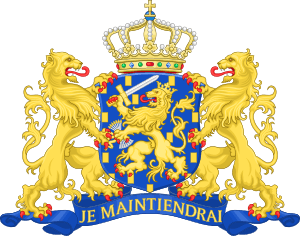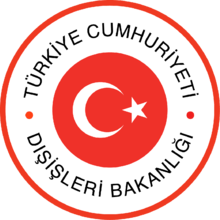Netherlands–Turkey relations
 |
|
Netherlands |
Turkey |
|---|---|
Dutch-Turkish relations refer to interstate relations between the Netherlands and Turkey. The diplomatic relations widely encompass and span four centuries, beginning in 1612. The first Turkish representative in the Netherlands started activities in 1859.
Before the Dutch had their own consuls in the Levant, they traded under the French Capitulations of 1569 until they sent Cornelius Haga as a Consul to Istanbul in 1611.[1] The States-General was responsible for appointing the consul, but the Levant merchants in these cases were closely consulted. The poor payment system for the consuls disrupted the potential successes of the relationship between consul and merchant community. The merchants requested changing to the Venetian fixed salary payment, but the States-General went against their wishes and tried to find other means of income.[2] This posed problems for the Dutch consuls, and there are many reports of cases where consuls exerted their authority over the nations members who did not want to pay consulate and embassy dues.[3] Despite internal struggle within the Dutch nation, it had a good relationship with the Ottoman’s and in 1804 Sultan Selim III (1789–1807) appointed the first resident representative to Amsterdam.[4]
Turkeye is a village of Sluis, a municipality located in the west of Zeelandic Flanders, in the south-western part of the Netherlands. In 1604, Prince Maurits changed the name of the village in Turkeye to thank the Turkish sailors for their support to the Dutch during the battle with the Spaniards in the Dutch War of Independence.
The history of Turkey and the Netherlands stretches back to the 17th century, when the first representative of the States-General was sent to the Sublime Porte. Relations between the two have continued every since, further cemented by Turkish guest workers in the ’60s and’70s, and today by strong economic ties. See an article written by Gürkan Celik: Turkey and the Netherlands: 400 years of diplomatic Relations, in Turkish Review, pp.50-53, issue 1, 2012].
Political relations
Turkey and the Netherlands are both members of the Council of Europe, the North Atlantic Treaty Organization (NATO), the Organisation for Economic Co-operation and Development (OECD), the Organization for Security and Co-operation in Europe (OSCE), the World Trade Organization (WTO) and the Union for the Mediterranean. Also the Netherlands is a European Union member and Turkey is a candidate.
Yunus Affair
During a state visit to the Netherlands In March 2013, Prime Minister Erdoğan criticized the placement of the Dutch-Turkish foster child Yunus with lesbian foster parents.[5] Deputy Prime Minister of the Netherlands Lodewijk Asscher considered the involvement of Turkey "totally inappropriate" and called it "presumptuous" when a foreign power expresses an opinion on the policy of Dutch foster care.[6] Erdoğan proposed that the Turkish Ministry of Family Affairs and the Dutch Ministry of Security and Justice consult each other about the care of children of Turkish origin, but Prime Minister Mark Rutte rejected this proposal. Rutte said that placement of a child in a foster family always involves trying to match the child's background to that of the foster family. Failing that, the interest of the child comes first, and no distinction is made on the basis of religion or sexual orientation.[7] Erdoğan is now turning to the European Court of Human Rights to enforce Yunus to be reunited with his biological parents.[8]
Economic relations
Trade volume between Turkey and the Netherlands has increased remarkably over the years. In 2008, the Netherlands exported for almost 4 billion euros worth of goods to Turkey. This amount is doubled compared to 2000. Turkey exported in the same year 1.6 billion euros worth of goods to the Netherlands, with a share of 32 percent for garments.[9]
Turkey is a very popular holiday destination for Dutch tourists. In 2009, more than 1.1 million Dutch tourists visited Turkey.[10]
As of February 2011, 1894 Dutch companies have invested in Turkey, declared the Foreign Minister of Turkey Ahmet Davutoglu,[11] making the Netherlands the country with the biggest investment in projects in Turkey.
Visits
| Guest | Host | Place of visit | Date of visit | Reference |
|---|---|---|---|---|
| Prince Willem-Alexander of the Netherlands Princess Máxima of the Netherlands |
President Ahmet Necdet Sezer | Ankara, Cappadocia, Istanbul and Kayseri | May 25–28, 2004 | [12] |
| Prime Minister Recep Tayyip Erdoğan | Prime Minister Jan Peter Balkenende | Huis ten Bosch, The Hague | June 16, 2004 | [13] |
| Queen Beatrix of the Netherlands Prince Willem-Alexander of the Netherlands Princess Máxima of the Netherlands |
President Ahmet Necdet Sezer | Ankara, Istanbul and Kayseri | February 27-March 2, 2007 | [14] |
| Prime Minister Recep Tayyip Erdoğan | Prime Minister Mark Rutte | Huis ten Bosch, The Hague | March 21, 2013 | [15] |
Diplomacy
|
|
See also
- Foreign relations of the Netherlands
- Foreign relations of Turkey
- Turks in the Netherlands
- Cornelius Haga
- Remigration Turkey Pulls, The Netherlands Pushes?, by GÜRKAN ÇELIK, an article on return migration published in Turkish Review
- NTFF - The Netherlands-Turkey Friendship Foundation
References
- ↑ De Groot 1978, pp. 88, 97
- ↑ Steensgaard 1967, pp. 31–33
- ↑ De Groot 1978, p. 221
- ↑ Steensgaard 1967, p. 25
- ↑ Erdogan: Homosexuality contrary to Islam The Jerusalem Post, 26 March 2013
- ↑ Bemoeienis Turkije met Yunus ongepast COC 17 March 2013 (Dutch)
- ↑ Rutte-en-Erdogan-oneens-over-kwestie-Yunus In: Elsevier 21 March 2013 (Dutch)
- ↑ Premier-Erdogan-stapt-naar-Europees-Hof-om-zaak-Yunus In: Elsevier 28 March 2013 (Dutch)
- ↑ Export naar Turkije licht toegenomen (Dutch)
- ↑ Turkije populairst bij Nederlanders (Dutch)
- ↑ Sayın Bakanımızın Hollanda Dışişleri Bakanı Uri Rosenthal ile Yaptığı Ortak Basın Toplantısı, 2 Şubat 2011, Ankara (Turkish)
- ↑ Prins van Oranje en Prinses Máxima bezoeken Turkije (Dutch)
- ↑ Minister-president Erdogan van Turkije bezoekt Nederland (Dutch)
- ↑ Programma staatsbezoek aan Turkije, 27 februari - 2 maart 2007 (Dutch)
- ↑ Minister-president Erdoğan van Turkije brengt bezoek aan Nederland (Dutch)
External links
- Embassy of The Netherlands in Ankara
- Embassy of Turkey in The Hague
- Consulate–General of The Netherlands in Istanbul
- Consulate–General of Turkey in Rotterdam
- Diplomatic missions of the Netherlands in Turkey
- Diplomatic missions of Turkey in the Netherlands

